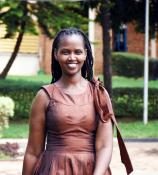Another research fora was organized at the University of Rwanda-Huye Campus in the quest to foster dialogue on topic of interest for researchers and society at large. Organized by the Centre of Diversity and Natural Resource Management, the scientific talk was a platform for established researchers and PhD students to discuss completed and ongoing research by showcasing its impact to the community. The talks were supported by UR-Sweden Programme as part of its mandate to promote research culture at the University of Rwanda.
Presentations were kicked off by Dr Brigitte Nyirambagutse who presented on “Carbon and Nutrient Cycling in Afromontane Tropical Forests at Different Successional Stages”, a study she conducted in Nyungwe forest. Her study aims to increase the understanding of the stocks and dynamics of C and nutrients in Afromontane tropical forests. She also seeks to explore possible differences between forest stands at different successional stages.
The results presented provide the most comprehensive synthesis to date of C cycling in tropical montane forests of different stages of succession.
Presentation by Nyirambangutse Brigitte
This research made great impact among others advancing the knowledge about the role of central African forest ecosystems in the global carbon cycle while contributing to the understanding of ecosystem services from tropical montane forests. It also facilitates Rwanda with knowledge on adaptation and mitigation options for climate change.
Another research group presentation was comprised of Aloysie Manishimwe, Bonaventure Ntirugulirwa and Prof Donat Nsabimana. They jointly presented on “Tropical montane forest in a warming world”. In their research, they conducted studies of biomass, photosynthesis, soil processes and climate in natural and planted forests.

Joint presentation from right Prof Donat Nsabimana,Aloysie Manishimwe and Bonaventure Ntirugulirwa
The trio pointed out that little is known about the response of tropical tree species, especially Afromontane species, to the predicted global warming and climate change. The recommended method includes plantations along elevational gradients to simulate different temperatures in combination with water and nutrient treatments.
A research topic on “Impact Assessment and Management of Invasive Alien Species in Rwanda” was conducted by Samuel Nshutiyayesu. His research aims among others to identify and list Invasive Alien Species- IAS (flowering plants, fish and insects) found in agro-ecosystems, natural forests, lakes and wetlands in Rwanda and find out major pathways for and drivers of the introduction and spread of the listed IAS. He also wants to develop a general management plan for the IAS with specific management plans of identified most harmful IAS.
Samuel Nshutiyayesu presented on Invasive Alien Species
Nshutiyayesu identified some of common harmful IAS including Protopterus aethiopicus and Prostephanus truncates but also showed their impact, prevention and control. He concluded that effective management of identified most harmful IAS will be a vital contribution to the conservation of biodiversity and natural ecosystems on one hand, and the improvement of local livelihoods on the other hand.
The research talks were concluded by the presentation of Parfait Yongabo on “Research and Innovation (R&I): An Integrated Frameworks for the Rwandan Agriculture Sector”. The study aimed at exploring current and future perspectives in the Rwandan context with regard to driving factors for research and innovation uptake. This is in consideration of theoretical foundations and empirical evidences in Rwanda as a mean to understand how research and innovation can contribute to economic development and community transformation.
Parfait Yongabo during his presentation
Yongabo who is a PhD student at Lund Univesity-Sweden called for harnessing the Triple Helix Model: University-Industry and Government which, according to him is an effective model in the Rwandan context.
More Photos
Also present, Prof Nelson Ijumba, the UR Deputy Vice Chancellor Academic Affairs and Research
Research talks were organized & coordinated by Prof Kaplin, the Director of Centre of Diversity and Natural Resource Management
Participants in research presentation
For full access to all the event photos : Click here
By Darius Murangwa
Communications Officer
